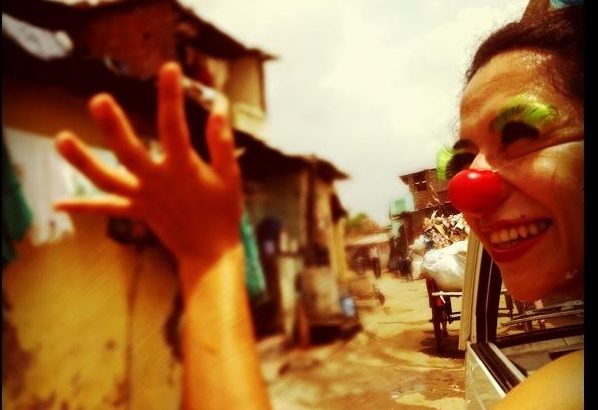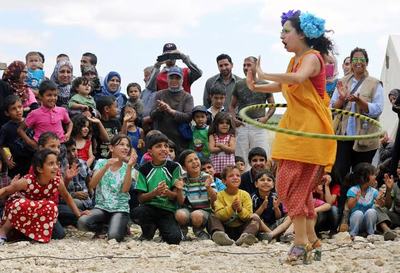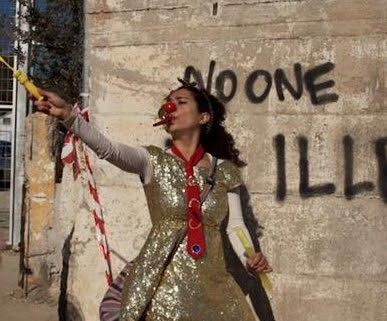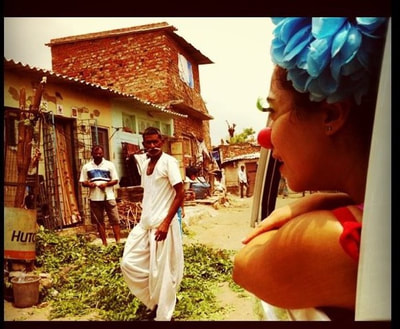|
|
|
While attending the global leadership event CultureSummit Abu Dhabi this past April I was surprised to see a “professional clown” among the roster of speakers. What do clowns have to do with global leadership and addressing some of the greatest challenges of our time? As it turns out, a lot. Sabine Choucair is a Lebanese humanitarian clown, storyteller, and performer. Through games, laughter, and the power of storytelling Sabine breaks down barriers of isolation, builds trust within and between communities, and brings refugee stories to film and stage. Her projects extend throughout Lebanon, The United Kingdom, The United States, Brazil, Mexico, India, Canada, Cyprus, Tunisia, Belgium, France, Cameroon, Morocco, Jordan and Dubai. Sabine was recently among the 40 cultural leaders chosen to share their work at the World Economic Forum at Davos in January 2017 Question One: Watching videos of the work you are doing in refugee camps throughout the world, I am struck by the amount of pride and trust you engender through the power of games, play, performance, and laughter. Why is clowning such a powerful tool to encourage connection, compassion, and conversation – both within and between communities? Clowning is all about truthfulness, transparency, hope and joy. Four key things that I think are very important to have in life and they are the main ingredients for finding the right honest connection between people. When I, as a clown, am out there and open to people around me, I am offering them the true side of myself with all the good and bad parts that I have, I open the space for everyone to be like this as well. Laughter is a great way for people to feel more relaxed and less anxious, to be more open to accepting themselves and to talk to others about deeper things especially in a non-judgmental atmosphere. Moreover, we often perform in public spaces for different communities and the best thing is that we end up having people who are laughing together as a homogenous group and enjoying together regardless of whether they usually talk to each other or even stay in the same place with each other. Laughter is a universal language that we clowns take advantage of. Question Two: In all of your projects you engage with communities on an extremely intimate scale, you are embedded within the very fabric of their lives. This year you attended both The World Economic Forum at Davos and the Abu Dhabi Culture Summit. While in Abu Dhabi, I heard a lot of (often heated) discussion about the tension between the wealth, access, and power represented at these types of global convenings in contrast to the impactful work being done at the local level. Do you think there is a need to better align high-level, often exclusive conferences with work being done on the ground? I have to say that being at both World Economic Forum and Abu Dhabi Culture Summit this year I saw that the will is there and that this kind of work is starting to happen but would definitely need more effort from both sides. We need everyone in this life to be working towards a better world and a more just one, actually. We need to take advantage of the wealth and power and direct it toward the impactful work being done on the ground.This will only happen by creating conversations between these two and working together. It can happen but we should definitely put more effort to meet more and listen to each other more. I would definitely like to have 1% of the money put into these conferences for some projects I am doing with communities though. Question Three: In his most recent book Thank you for Being Late, Thomas Friedman asserts that “In this age of tightening global interdependence and intimate contact between more diverse strangers, the bridges of understanding that we have to build are longer, the chasms they have to span much deeper. And that only makes the need for community building and healthy communities that can anchor diverse populations greater.” Can you speak to the importance of working at the local level to bring about global change? I can talk about the awesomeness of meeting real honest people on a daily basis, of getting to know them and them me on a different level that is deeper and more joyful than anything else in the world. These communities, I believe, are the ones who make a difference in life. They’re doers and not talkers. They’re inspiring and they are always in the state of becoming; which is one important thing we need to achieve global change. I feel honoured and lucky to have the opportunity to learn from their resilience and to be part of their inspiring world. I work with the poorest and most disadvantaged and they never fail to show me the importance of action and hope, how change starts from within and from small initiatives instigated by communities. One More Thing... Who do you think is doing the most innovative, interesting, disruptive work right now and why? There’s a lot of inspiring great work being done for the good of this world. I would be very unfair to many by answering this question. All I know is that all these projects are what is keeping us going and giving us hope. This is how we are all fighting injustice, extremism, wars, and much more.
0 Comments
Leave a Reply. |
Archives
April 2019
Categories |




 RSS Feed
RSS Feed